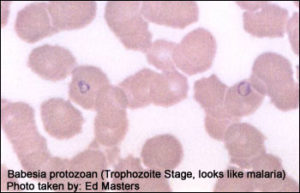
SHARE THIS ARTICLE:
In Vitro Study: Botanical Medicines Against Babesia Duncani
 The use of botanical medicines in the fight against Babesia duncani is explored in Frontiers in Cellular and Infection Microbiology by Johns Hopins’ Yumin Zhang and a research team.
The use of botanical medicines in the fight against Babesia duncani is explored in Frontiers in Cellular and Infection Microbiology by Johns Hopins’ Yumin Zhang and a research team.
The article states that although Babesia duncani was first described almost 30 years ago, due to treatment failures and undesirable side effects, the current treatment for human babesiosis has remained inadequate.
By examining a panel of herbal medicines that included Cryptolepis sanguinolenta, Artemisia annua, Scutellaria baicalensis, Alchornea cordifolia, and Polygonum cuspidatum, the research team determined the botanical remedies as having good in vitro inhibitory activity against B. duncani in the hamster erythrocyte model. Potential bioactive compounds, cryptolepine, artemisinin, artesunate, artemether, and baicalein, also demonstrated good activity against B. duncani.
The researchers propose that these botanicals be considered as candidates for clinical development due to their low cost, satisfactory toxicity and pharmacokinetic profiles, and history of safe and effective use in clinical trials and/or traditional medicine. Additional research is needed to distinguish bioactive components and determine their efficacy against other Babesia species in vitro and in vivo.
Read the Babesia botanical study.
Other preliminary studies had been done by researchers against Borrelia burgdorferi, the bacteria that causes Lyme disease.
Click here to see botanicals against Borrelia burgdorferi.
Learn more about Babesiosis on LDA’s website.





